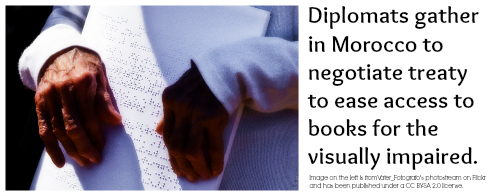June 19, 2013: Diplomats from 186 member countries of the World Intellectual Property Organisation (“WIPO”) have gathered at Marrakesh in Morocco to negotiate the text of the Treaty on Limitations and Exceptions for Visually Impaired Persons/Persons With Print Disabilities (“the Text”).
The purpose of such a treaty is to ease access to books for the blind, visually impaired, and other print-disabled persons. With ninety per cent of the 314 million blind and visually impaired persons residing in developing countries, the conference is seen as an important occasion to negotiate limitations and exceptions in domestic copyright laws that will allow special provisions for the visually impaired. For instance, the Text permits certain authorised entities to make available to the visually impaired (and other beneficiaries), a copy of a work in an accessible format, without the authorisation of the copyright holder. Further, the Text also provides for the negotiation of licenses with the copyright holders to exchange special formats across borders, or to produce their own materials to make the work accessible to the visually impaired.
The conference is expected to be the culmination of years of discussions on making more works under copyright available for the visually impaired in special formats and accessible versions. India has one of the largest populations of visually impaired persons and has been at the forefront of the discussions on disability rights within intellectual property law. Rahul Cherian, one of the founders of the Inclusive Planet Centre for Disability Law and Policy, had been involved in drafting the Text.
Groups such as the Motion Picture Association of America have vociferously opposed any such limitation or exception in the copyright laws. They have even lobbied for stricter protection for Digital Rights Management technology in the Text, as well as the removal of any references to “fair use” or “fair dealing”.
(Samar Jha is part of the faculty on myLaw.net.)

